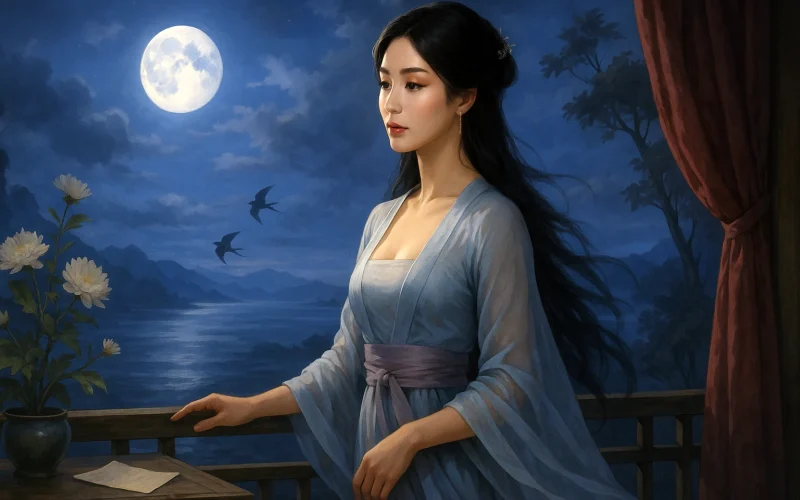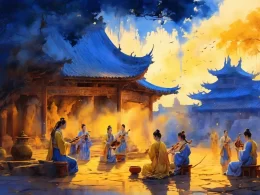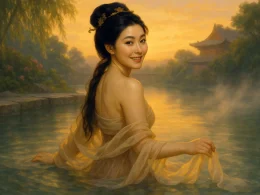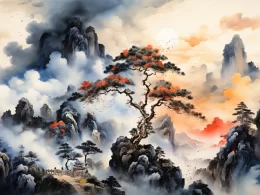Little words on pink paper
Tell all my heart to the receiver.
Wild geese are high in clouds, fish deep in water.
How to send to him my love’s sad daughter?
Alone on western tower at sunset,
I find the distant hills my eyelashes wet.
Where is the face that once did appear?
Green waves roll eastward as ever.
Original Poem
「清平乐 · 红笺小字」
红笺小字,说尽平生意。
鸿雁在云鱼在水,惆怅此情难寄。斜阳独倚西楼,遥山恰对帘钩。
晏殊
人面不知何处,绿波依旧东流。
Interpretation
This lyric was composed during the Northern Song Dynasty, representing one of Yan Shu's most characteristic works expressing separation and longing. At that time, the poet, distressed by the departure of his soulmate and the difficulty of communication, poured his intense yet unanchored emotions into this poem. Through delicate depictions of scenery, the poem conveys the melancholy of being unable to connect with the beloved, demonstrating a rare subtlety and depth of emotion in Yan Shu's works—marked by quiet sorrow and profound affection.
First Stanza: "红笺小字,说尽平生意。鸿雁在云鱼在水,惆怅此情难寄。"
Hóng jiān xiǎo zì, shuō jìn píngshēng yì. Hóngyàn zài yún yú zài shuǐ, chóuchàng cǐ qíng nán jì.
Tiny words on crimson paper, / Pouring out a lifetime's feelings. / But wild geese soar high in clouds, fish swim deep in water— / How sorrowful that this love cannot be sent.
The opening lines, "tiny words on crimson paper," convey the urgency of the speaker's confession. The allusions to "wild geese carrying letters" and "fish bearing messages"—traditionally symbols of hope—here become signs of futility, emphasizing the depth of unrequited longing. In just a few lines, the pain of separation is laid bare.
Second Stanza: "斜阳独倚西楼,遥山恰对帘钩。人面不知何处,绿波依旧东流。"
Xié yáng dú yǐ xī lóu, yáo shān qià duì lián gōu. Rénmiàn bùzhī héchù, lǜ bō yījiù dōng liú.
Alone at sunset, leaning on the west tower, / Distant mountains align with the curtain hook. / That beloved face—where has it gone? / Only the green waves still flow eastward, as ever.
The second stanza shifts to a scene of solitary contemplation. The poet gazes from the tower, seeing only the landscape—not the one he longs for. "Distant mountains align with the curtain hook" visually reinforces separation, while "that beloved face—where has it gone?" echoes Cui Hu's famous lament, deepening the sorrow. The final image, "green waves still flow eastward," extends the melancholy infinitely, leaving the emotion lingering and unresolved.
Holistic Appreciation
With delicate and poignant strokes, this lyric poem unfolds an unspoken, profound affection through imagery of letters, towers, distant mountains, and flowing waters. The first stanza depicts heartfelt words penned on crimson stationery, yet with no wild geese or fish to carry them—expressing the futility of conveying deep emotions. The second stanza paints a backdrop of slanting sunlight over a western tower, curtain hooks framing far-off hills, sketching a solitary figure gazing into emptiness, their soul adrift in longing. The closing line—"the beloved's face is nowhere to be found, while green waves flow ever eastward"—reaches lyrical heights only to dissolve like the river's current, subtle and lingering. A masterful blend of scene and sentiment, this poem stands as one of Yan Shu’s most emblematic works of longing.
Artistic Merits
The poem’s language is elegant and refined, its mood profound yet understated. It deftly employs classical allusions—"wild geese bearing letters," "fish carrying messages," and "a face like peach blossoms"—while weaving tender yet melancholic imagery with "slanting sunlight," "western towers," and "curtain hooks." Scene and emotion merge seamlessly; the structure shifts from inner reflection to outward observation, intensifying the emotional depth with each layer. Yan Shu’s meticulous craftsmanship blends deep feeling with lyrical grace, creating a unique artistic style where quiet elegance conceals unspoken sorrow.
Insights
This poem conveys a gentle yet profound sorrow of separation, capturing humanity’s helplessness when love cannot be delivered. In modern terms, it reminds us to cherish present connections—for when true affection loses its means of expression, even the most heartfelt words, penned on crimson paper, may drift away like the eastern-flowing river, leaving only regret. With delicate, evocative strokes, the poet transforms eternal longing into poetic melancholy, resonating deeply across time.
Poem Translator
Xu Yuanchong (许渊冲)
About the Poet
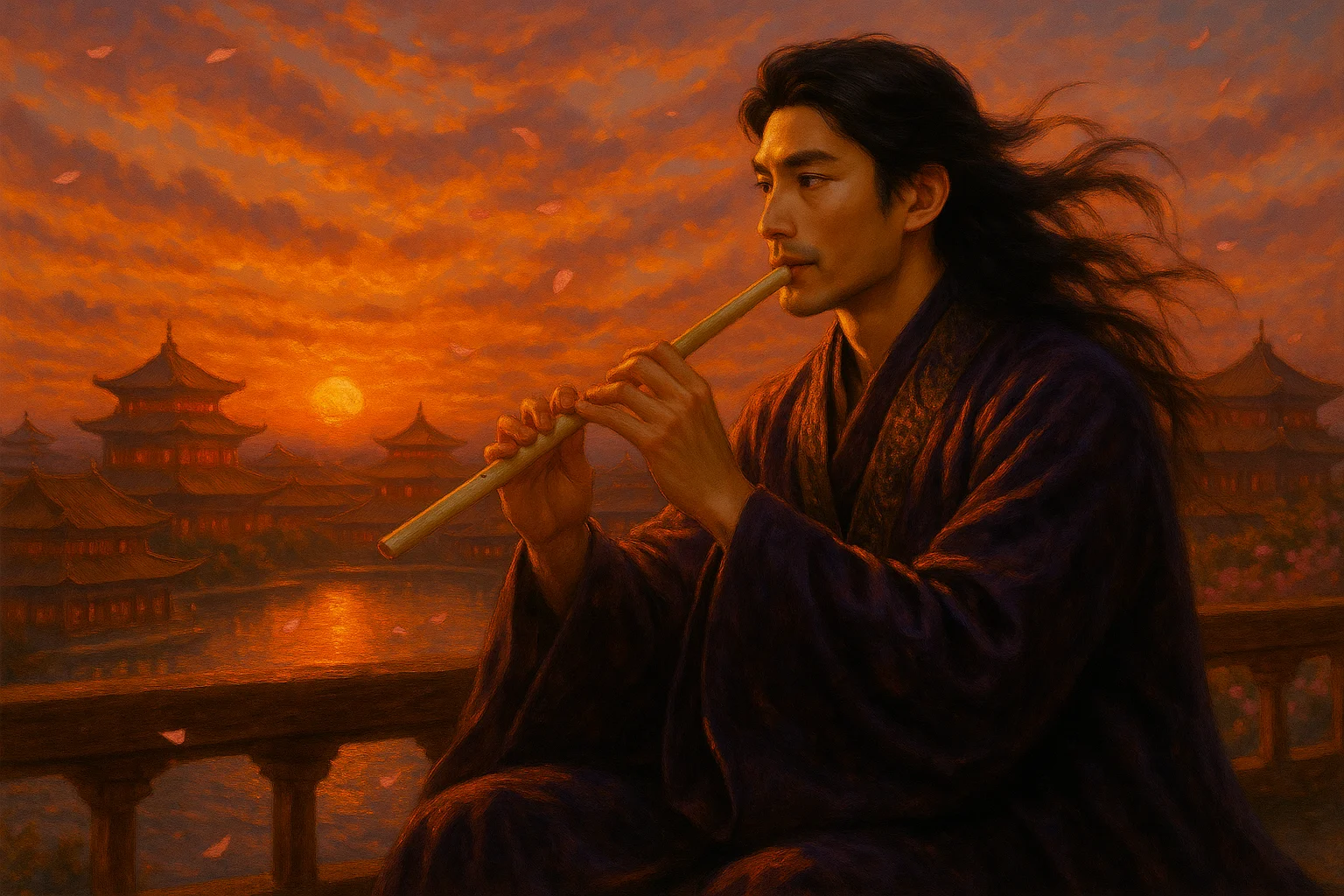
Yan Shu (晏殊 991 – 1055) Originaire de Fuzhou dans le Jiangxi, Yan Shu fut le maître fondateur de l'école wanyue (élégante et retenue) de la poésie ci sous les Song du Nord. Enfant prodige entré dans l'administration à quatorze ans, ses ci allient noblesse classique et méditation philosophique dissimulée sous des évocations de prospérité raffinée. Mentor de talents comme Fan Zhongyan et Ouyang Xiu, il initia l'École du Jiangxi en poésie ci et posa les bases de l'épuration du genre sous les Song.








